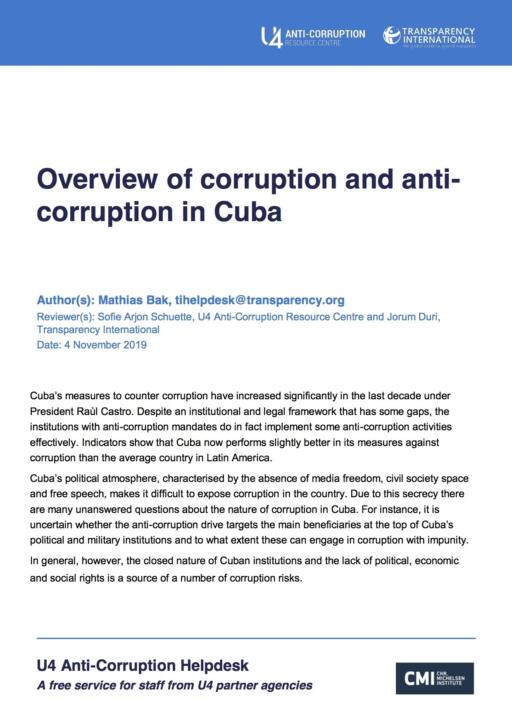
This Anti-Corruption Helpdesk brief was produced in response to a query from a U4 Partner Agency. The U4 Helpdesk is operated by Transparency International in collaboration with the U4 Anti-Corruption Resource Centre based at the Chr. Michelsen Institute.
Query
Please provide an overview of corruption and anti-corruption in Cuba.
Summary
Cuba’s measures to counter corruption have increased significantly in the last decade under President Raùl Castro. Despite an institutional and legal framework that has some gaps, the institutions with anti-corruption mandates do in fact implement some anti-corruption activities effectively. Indicators show that Cuba now performs slightly better in its measures against corruption than the average country in Latin America.
Cuba’s political atmosphere, characterised by the absence of media freedom, civil society space and free speech, makes it difficult to expose corruption in the country. Due to this secrecy there are many unanswered questions about the nature of corruption in Cuba. For instance, it is uncertain whether the anti-corruption drive targets the main beneficiaries at the top of Cuba’s political and military institutions and to what extent these can engage in corruption with impunity.
In general, however, the closed nature of Cuban institutions and the lack of political, economic and social rights is a source of a number of corruption risks.
Contents
- Background
- Extent of corruption
- Nature of corruption risks
- Sectors vulnerable to corruption
- Anti-corruption framework
- Stakeholders
- References
Main points
- Despite an anti-corruption drive and the fact that Cuba performs better than the average country in Latin America and the Caribbean, evidence suggests that corruption is still a major issue.
- Though it is difficult to gain insights into the exact patterns of corruption in Cuba, available evidence suggests that bribery and theft are common issues.
- Since the death of Fidel Castro, the army has increased its hold on Cuban society and has emerged as a central actor in both politics and the economy. These developments are associated with some serious corruption risks
- Severe repression of independent civil society organisations and media outlets creates a culture where it is difficult to expose corruption and hold the government of Cuba accountable.
- In general, Cuba’s ability to expose and get to grips with corruption is hindered by limited political and civil liberties and one of the world’s most restrictive media environments.
Caveat
Due to the closed nature of the country, it is difficult to find systematically gathered data on the extent and nature of corruption in Cuba. To overcome this challenge, this overview attempts to synthesise available case evidence.
Authors
Mathias Bak, [email protected]
Reviewers
Sofie Arjon Schuette, U4 Anti-Corruption Resource Centre and Jorum Duri, Transparency International
Date
15/04/2020

